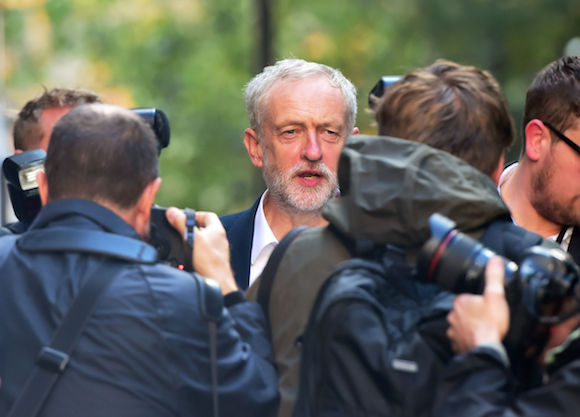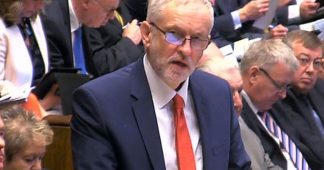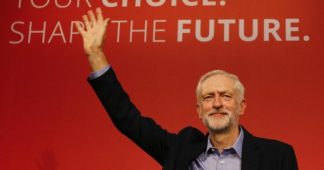By Bryan MacDonald
It was June, 2015. And RT UK’s Afshin Rattansi was interviewing a man in a beige blazer about his unlikely bid to lead British Labour. His name was Jeremy Corbyn, and he spoke a lot of sense. Too much of it to win the leadership contest, it immediately appeared.
Over the following weeks, Corbyn’s support increased, and the Labour-leaning mainstream media became more-and-more opposed to his candidacy. Particularly the Guardian, a newspaper which professes to be a leftist organ, but, in reality, will always favor liberal causes over those affecting the poor. With this in mind, they enthusiastically backed Andy Burnham, a Blairite, who lost to Corbyn in a landslide (19 percent to 59 percent).
At the same time, the Tory-supporting Daily Mail, Daily Telegraph, Times and The Sun welcomed the new Labour leader with glee. Because they assumed he’d make the Conservative’s hold on power even stronger. They spent the next two years ridiculing Corbyn, until just before Thursday’s poll when they realized he had a realistic chance of upsetting their favored Theresa May.
A new low
The Mail’s attack was something else.
Regardless of your voting intentions, the Daily Mail and The Sun's attempt to smear Corbyn and politicise terrorism is disgusting/pathetic. pic.twitter.com/QsPaa33lho
— Will Phillips (@Monkiflops) June 7, 2017
An unprecedented thirteen-page smear assault which plowed the depths of thuggery, and exhibiting all the class and restraint of a drunk left alone overnight in a wine cellar.
First thirteen pages of today's Daily Mail are absolutely relentless. pic.twitter.com/IJEYqcQmk4
— Jim Waterson (@jimwaterson) June 7, 2017
Meanwhile, Rupert Murdoch’s Sun
The Sun really stepping up the attack on Corbyn. These scumbags smeared Liverpool after the Hillsborough tragedy, don't buy their lies! pic.twitter.com/Len1YIgTks
— OhDearBritain (@Ohdearbritain) June 7, 2017
also maligned and vilified the opposition leader with a variety of insults of which “Marxist extremist” was probably the most kind. And its sister paper, The Times, appeared to have a full-time Corbyn-basher, one Oliver Kamm, whose obsession with besmirching the politician built up to crescendo by polling day.
Of course, Kamm, and his fellow travelers were trying to protect their bosses’ beloved Theresa May and her sacred majority. But notionally leftist opponents of Corbyn are the ones looking like the biggest mugs today.
Here’s a selection of Guardian comment headlines from the past 24 months or so.
Great thread. Here are above screen shots in one combined pic. pic.twitter.com/h61EEWbkPB
— Ludwig W (@LudWitt) June 4, 2017
30 July 2015 – Michael White – “If Labour elects Jeremy Corbyn as leader, it will be the most reckless move since choosing the admirable but unworldly pacifist, George Lansbury, in 1932.”
25 June 2016 – Polly Toynbee – “Dismal, spineless, Jeremy Corbyn let us down again.”
28 June 2016 – Editorial – “The question is no longer whether his (Corbyn’s) leadership should end because at Westminster it already has. The challenge for the Labour left is to rescue something from it.”
14 December 2016 – Rafael Behr – “Jeremy Corbyn may be unassailable, but he is not leading Labour.”
11 January 2017 – Suzanne Moore – “Labour’s Corbyn reboot shows exactly why he has to go.”
1 March 2017 – Owen Jones – “Jeremy Corbyn says he is staying. That’s not good enough.”
5 May 2017 – Jonathan Freedland – “No more excuses: Jeremy Corbyn is to blame for this meltdown.” (almost a month before polling day).
Also, 5 May 2017 – Nick Cohen – “Corbyn & (John) McDonnell could limit a Tory landslide by resigning now. That they would rather die, shows the far left is an anti-Labour movement.” (ditto)
And let’s not forget The New Statesman, where Jason Cowley suggested, only on Tuesday, that Corbyn could be leading his party to “its worst defeat since 1935.” Two days before he delivered Labour’s biggest vote share increase since 1945.
And that was the election where Labour’s greatest ever chief, Clement Attlee, stunned a victorious Winston Churchill in the aftermath of World War Two. Or Cowley’s colleague, George Eaton, who told us in March: “Jeremy knows he can’t do the job…. senior figures from all parties discuss the way forward: a new Labour leader, a new party or something else?”
The new wave
Also, worth a mention in this social media era, are Twitter “freelancers” like the author JK Rowling. In September of last year, she described Corbyn as “Utterly deluded,” saying “I want a Labour govt (sic), to help people trapped where I was once trapped. Corbyn helps only Tories.”
Utterly deluded. I want a Labour govt, to help people trapped where I was once trapped. Corbyn helps only Tories. https://t.co/dkByEryX6R
— J.K. Rowling (@jk_rowling) September 1, 2016
The Labour leader has achieved something remarkable this week. Of course, he hasn’t won the election, but given the sheer scale of the propaganda he had to overcome, Labour’s performance was truly extraordinary.
The myopia of the establishment media is also something to behold.
Andrew Marr: 'No one really expected Corbyn to be such a cracking campaigner' Yes we did. But you weren't listening to us. #InsidetheBubble
— Neil Clark (@NeilClark66) June 8, 2017
Here’s BBC’s Andrew Marr: “No one expected Corbyn to be such a cracking campaigner.” But as Neil Clark correctly points out “yes we did. But you weren’t listening to us.”
And therein lies the rub. The mainstream press devotes endless broadcast hours and column inches to bombarding its readers and listeners with scare stories about alternative media outlets. Which, naturally, includes the very website you are reading right now.
If they called off the hounds and took some notice, they might realize why alternate video, radio and blog services have become so popular – because often they see plainly the reality that the establishment media simply refuses to.
And how the incredible bias and shortsightedness of traditional industry leaders is the primary reason. Corbyn has laid bare their vulnerabilities this week, and these self-appointed emperors have been exposed as scant of cloth. Thus, he’s achieved a result his beloved Arsenal used to revel in. It’s 1-0 to Jeremy Corbyn. And fair play to him.











